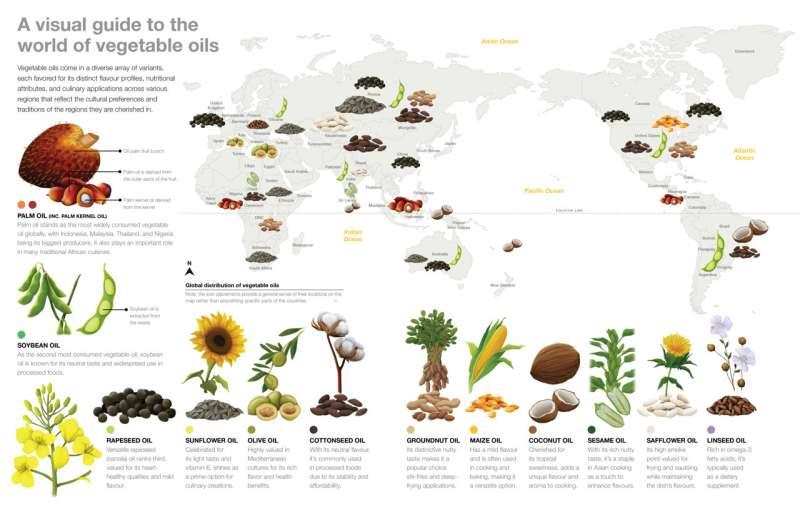When shopping, have you considered the social and environmental impacts of your vegetable oil purchases? Most products offer limited information on these effects. Labels like "No Palm Oil"—linked to environmental damage and threats to orangutans—or "Fair-trade" are familiar, but many ingredients go unmentioned. How reliable are these claims, and what unseen impacts are we responsible for with our choices?
Few topics have provoked as many polarized views and headlines as oil crops. These controversies span conservation, human rights, and nutrition. What does the evidence reveal?
A report by the IUCN Oil Crops Taskforce dives deep into the often controversial environmental, social, economic, and nutritional impacts of vegetable oil crops. Their research shatters the myth that crops like oil palm, soybean, or rapeseed are inherently good or bad. Instead, the report reveals it's all about how these crops are grown, processed, and traded. It's the practices, not the plants, that make the difference.
Palm oil and soya have particularly bad reputations. But while it's true that they can have devastating impacts on tropical forests and on indigenous peoples, they can also have benefits, especially where they are grown by local families and smallholders under deforestation-free standards, and the alternatives may be much worse.
At the other end of the spectrum, olive oil is often seen as a healthy, traditional crop, but where it is grown intensively, it, too, can have major negative impacts on water supplies, biodiversity, and local people.
Oil crops take up 37% of all cropland and are a major driver of biodiversity loss. The production, processing and trade of many of these crops are associated with human rights violations, such as forced labor, land grabbing or negative health impacts from agrochemicals. For example, it has been reported that 7 liters of agrochemicals are consumed by every Brazilian every year, largely because of intensive production systems that use genetically modified, herbicide-resistant crops.

But these oil crops are also an important source of income for many vegetable oil producers. Furthermore, oils and fats are essential to a healthy diet, supplying 25-35% of daily energy needs, and some have culinary traditions that date back thousands of years.
Demand for vegetable oils is growing rapidly. In 2021, 252 million tons of oil were produced for a population of nearly 8.5 billion people. To feed the projected population of 9.7 billion in 2050 (assuming no further oil is redirected for biofuel, animal feed or in industry), production output will need to rise by 14% to 288 million tons. How this additional production is met will have major environmental, social and economic implications.
"What this report shows is that positive environmental can be achieved with all oil crops. With the right investment, planning, policies and improved crop production methods, oil crop areas can offer substantial opportunities for reducing biodiversity loss, addressing human rights issues and restoring nature," said Erik Meijaard, report lead author and co-chair of IUCN's Oil Crops Task Force.
The same applies to social outcomes "If human rights are respected then oil crops won't generate land grabbing and ensuing conflicts," said Marcus Colchester, member of the IUCN Commission on Environmental, Economic and Social Policy and initiator of the study.
The example of oil palm makes this clear. These palms occur (semi) wild in various African forests and village gardens, where they are managed without chemical fertilizers or pesticides. Demand for such apparently benign palm oil is growing, and there are millions of hectares of such oil palm. The same crop, however, is also grown in vast monocultures that have replaced species-rich tropical forests in Asia where indigenous people, as well as orangutans and other wildlife, once lived.
When we look at other oil crops such as soybean, olive, rapeseed, sunflower, and peanut, or less well-known ones such as sesame, shea, babassu, or the African Allanblackia, we realize that all crops, when produced with little consideration of people or nature, can have negative impacts.
"Media and vested interests have created a narrative that demonizes oil crops such as oil palm and celebrates others such as coconut and olive," said Malika Virah-Sawmy, co-chair of the IUCN Oil Crops Task Force.
"Our study shows that this distinction is artificial and unhelpful and that rather than focusing on these oil crops themselves, politicians, producers, traders, and consumers need to seriously look at which production practices and scales of production are best for meeting growing oil demand with the least negative impacts."
Click here to see more...